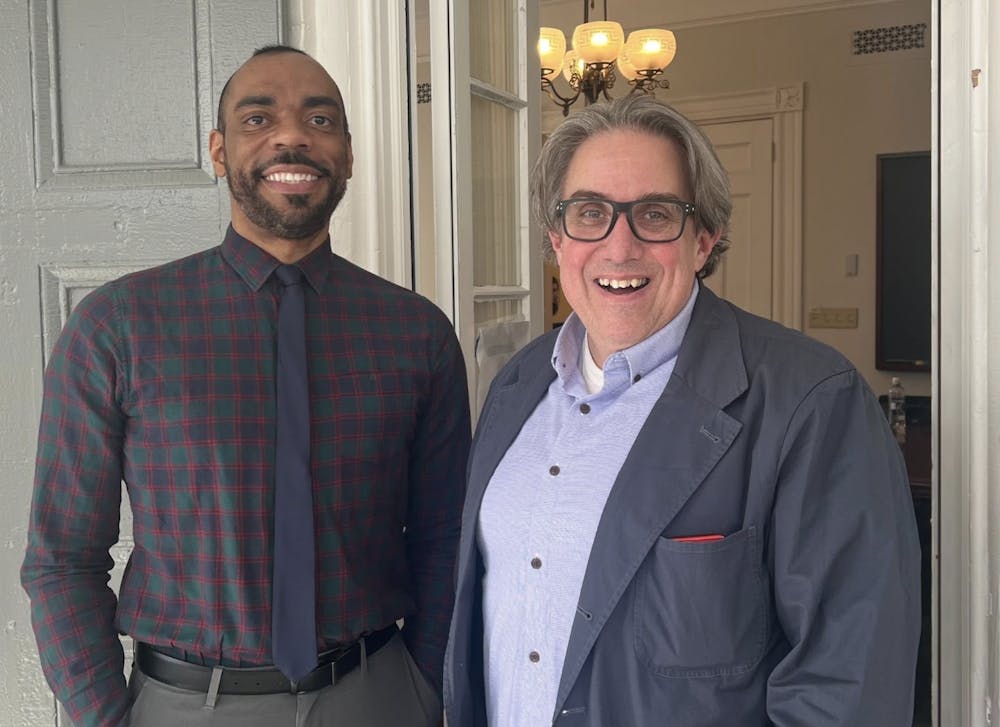William Dorsey Swann, a man who was first born into slavery in 1860, 20 years later became the first drag queen recorded in history and held secret drag balls in Washington DC, according to Ferris Professor of Journalism Channing Joseph. Joseph spoke at the Program in Journalism’s Lunch Talk about Swann and his upcoming book, reflecting on how Black queer history is told.
The talk was moderated by Brian Herrera, an Associate Professor of Theater in the Lewis Center for the Arts.
The reexamination of Black queer history is at the heart of Joseph’s upcoming book, House of Swann: Where Slaves Became Queens — And Changed the World, which focuses on the “origins of drag from the 1880s to the present day,” and how “Black queer leaders played central roles in movements like emancipation, civil right, and LGBTQ+ pride.”
Herrera described Joseph’s book as “a piece timed deftly for Black history month in the U.S. and LGBTQ+ history month in the U.K.”
Joseph’s book tells the story of multiple thefts of female underwear and attire, by drag queens who gathered at what was coined the House of Swann, becoming the basis for the first recorded formation of drag culture in the United States.
Following the reading, Joseph discussed his research and answered questions from faculty in attendance.
One attendee asked Joseph what was at stake when introducing Swann into the historical context of being the first drag queen.
In response, Joseph posed the question, “Who really is the first?” Following his response, he added that this question comes as a result of history being overlooked time and time again.
Joseph also stated that in spite of Swann’s false imprisonment following the police raids, these raids are some of the only reasons we know the drag parties existed, citing an article in the Washington Post from April 13, 1888 about the arrests.
Joseph then turned to the “Emancipation Day Parade,” a historical event which was influenced heavily by other Black queer leaders, including drag queens who were called “queens of liberty.”
Joseph said that the parade was a topic of debate within the Black community, as some wanted to celebrate emancipation while other Black people wanted to forget about their experiences of slavery.
However, in spite of the contest within the Black community, the parade went on. In a TED Talk, Joseph referred to the parade in saying “the power to choose how to define ourselves is more important than ever.”

When an attendant asked why people should care, Joseph said he believes that from these stories, society creates a more truthful picture of American society.
“If you’re interested in learning about survival under oppression, then look to the most oppressed groups,” Joseph said. “We can’t understand America and society fully without these stories.”
Joseph and Herrera agreed that these stories have to belong to the original sources.
“Sometimes we have to go to sources that aren’t labeled sources,” Herrera added as he discussed the importance of bringing the history of our past to light in hopes of a better understanding amongst the general public. “What might be understood with context can further history.”
Joseph emphasized that he doesn’t want the book to be academic, in hopes that it increases relatability among readers.
“I'm hoping that by not making it so academic, perhaps ... those that don’t identify as queer may feel included,” he said. “I want to focus on the impacts on how these characters live and impacts on the world.”
Joseph suggested that terms LGBTQ+ people used in the past to describe themselves that are not politically correct in society today can tell us about the history of the individuals from the past.
“It was [LGBTQ+ people’s] way of searching,” Joseph added.
Joseph celebrated the experience of members of the LGBTQ+ community discovering their identity as an “epiphany,” but noted “this experience was denied to people in the past.”
Joseph ended the event by stating that he hopes the book will lead to greater understanding and recognition among the general public on the impact of Black queer people.
“Whatever we are today will lead to something new and fresh in the future,” he said.
The event took place on Feb. 14 from 12:00 - 1:15 p.m. in Room 16 of the Joseph Henry House.
Justus Wilhoit is an Assistant News Editor at the ‘Prince.’
Please send any corrections to corrections[at]dailyprincetonian.com.








